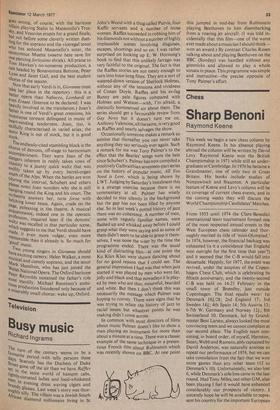Te levision
Busy music
Richard Ingrams
-file turn of the century seems to be a favourite period with telly persons these d,,ays. Scarcely has the Duchess of Duke Street
gone off the air than we have Raffles
se' in the same world of hansom cabs, tiro, °AY-corseted ladies and loud-whiskered brandy in evening dress waving cigars and randy glasses. Last week's story was thor°ughlY silly. The villain was a Jewish South African diamond millionaire living in St John's Wood with a thug called Purvis, four Kaffir servants and a number of loose women. Raffles succeeded in robbing him of his diamonds not without a number of highly implausible scenes involving disguises, escapes, shootings and so on. I was rather surprised on looking up E. W. Hornung's book to find that this unlikely farrago was very faithful to the original. The fact is that the Raffles stories are not meaty enough to turn into hour-long films. They are a sort of watered-down version of Sherlock Holmes, without any of the tensions and vividness of Conan Doyle. Raffles and his ex-fag Bunny are pale figures compared with Holmes and Watson—with, I'm afraid, a distinctly homosexual air about them. The series should get a favourable review from Gay News but it doesn't turn me on. Anthony Valentine, all the same, is very good as Raffles and nearly salvages the show.
Occasionally someone makes a remark so asinine that thereafter you can never take anything they say seriously ever again. Such a remark for me was Tony Palmer's to the effect that the Beatles' songs were the best since Schubert's. Palmer has now compiled a positively Galbraithian seventeen-Part series on the history of
Popular music, Al! You Need is Love, which is ,being shown by LWT. Judging by Saturday's instalment this is a strange exercise because there is no commentary at all. Palmer has wisely decided to stay silently in the background but the gap has not been filled by anyone else. So in last week's potted history of jazz there was no coherence. A number of men, some with vaguely familiar names, were flashed up and whisked away before I could grasp what they were saying and as some of them didn't seem to be able to grasp it themselves, I was none the wiser by the time the programme ended. There was the usual kind of distracting film—at one point the Ku Klux Klan were shown dancing about for no good reason that I could see. The general impression I had was that when jazz started it was played by men who were fat, jolly and black and that nowadays it is played by men who are thin, mournful, bearded and white. But then I don't think this was necessarily the message which Palmer was hoping to convey. There were signs that he was trying to relate the history of jazz to racial issues but whatever points he was making didn't come across.
In common with most directors of films about music Palmer doesn't like to show a man playing an instrument for more than about a minute at a time. There was a classic example of the same technique in a pretentious French film about Rubinstein which was recently shown on BBC. At one point
this jumped in mid-bar from Rubinstein playing Beethoven to him disembarking from a roaring jet aircraft. (I was told incidentally that this film—one of the worst ever made about a musician I should think-won an award.) By contrast Charles Rosen talking about and playing Beethoven on the BBC (Sunday) was handled without any gimmicks and allowed to play a whole sonata in peace. This programme was simple and instructive—the precise opposite of Tony Palmer's effort.






































 Previous page
Previous page